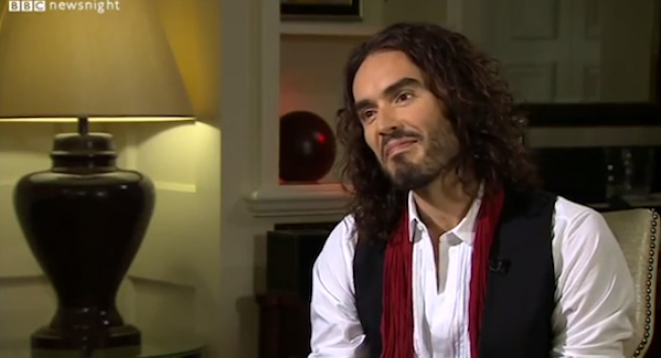Is Russell Brand lost in revolutionary rabbit holes?

Russell Brand recently appeared on the BBC's Newsnight with Jeremy Paxman and launched into a fiery tirade against the UK's democratic system. His call for revolution hit a chord in the UK, sparking diverse reactions in the social enterprise space.
But what really lurks in the rabbit holes of revolutionary utopia asks Pathik Pathak Lecturer in Sociology at the University of Southampton, as he offers up insights from within the social enterprise movement in a letter to Russell Brand.
Dear Russell…
I respect your right to pontificate on the dismal state of parliamentary democracy. You’re not alone in your anger.
Like you, I scowl at the belief that parliament is capable of anything other than perpetuating the destruction of the environment and the exploitation of the vulnerable. Albert Einstein once said that the definition of insanity was doing the same thing over and over again and expecting different results; electing the same kinds of people from the same kinds of backgrounds and expecting wholesale change is tantamount to the same kind of madness.
Unlike you, I don’t believe the answer lies in revolution because I don’t put my faith in systems or ideologies. In your interview with Paxman you skated over the idea of what your revolution would bring but offered us the delightful promise of a “socialist corporatist state” officiated by “admin bods”, presumably because politicians are too venal. Revolutionary talk such as yours generates a lot of heat but precious little light. It’s easy to ignite an incendiary fuse, but much harder to ditch the romanticism of revolution for something real and achievable.
Perhaps your preoccupation with overhauling government has blinded you to the opportunities to disrupt dysfunctional systems from within. Disruptive entrepreneurs are all around us, challenging the prevailing orthodoxies which dictate that cataract surgery is beyond the poor, that primary education needs expensive infrastructure, or that the homeless and ex-offenders are destined to be parasites on society’s margins.
Revolution implies that radical change can only happen through an explosive reaction which obliterates inequitable social arrangements and gives birth to shiny new egalitarian ones. The Left often chooses to dismiss social entrepreneurship as tinkering at the margins; rejecting the possibility that anything radical could ever emerge from a practice so complicit with dominant frameworks of capitalism or business.
Disruptive entrepreneurship shows us that something else is possible: systems can be imploded from within, small chinks in the general gloom can be generative catalysts for something more universal, and innovation by innovation we can remake the world to serve those who most deserve it, not those who inherit wealth or privilege. Disruptive entrepreneurs have created business models which started life on the peripheries of the global economy but which are gradually, incrementally, transforming economic systems.
Tub-thumping for revolution will always ring louder than the whisper of disruptive entrepreneurship, but you’d be surprised by the power of example. Show people something that works, and the desire to replicate and improve it is strong. The global reach of the Occupy movement is no doubt impressive, but so are the peer networks of disruptive entrepreneurs. We are getting organized in ways unimaginable years ago, leveraging digital technologies and drawing in more and more marginalized groups as stakeholders in the challenge of systemic disruption.
You make the point that we need an economic, cultural and cognitive shift to achieve revolution, but that won’t happen through civil disobedience or mass occupation alone. We need disruptive innovations to shift the axis of our behaviour and destabilize the economic order by offering us alternative models of production, consumption, exchange and investment.
The bankruptcy of our political paradigm is unquestionable. The need for urgent action is unavoidable. That doesn’t mean we should grope for a messianic manifesto at the expense of effective problem-solving in the here and now. Instead of enticing our disenfranchised youth down the rabbit holes of revolutionary utopia – whatever you imagine that will look like – let’s instead encourage them to disrupt systemic failures one venture at a time.
You’re right to say that we don’t have luxury of tradition. We also don’t have the luxury of idle chatter about revolution.
You can watch the interview here.
